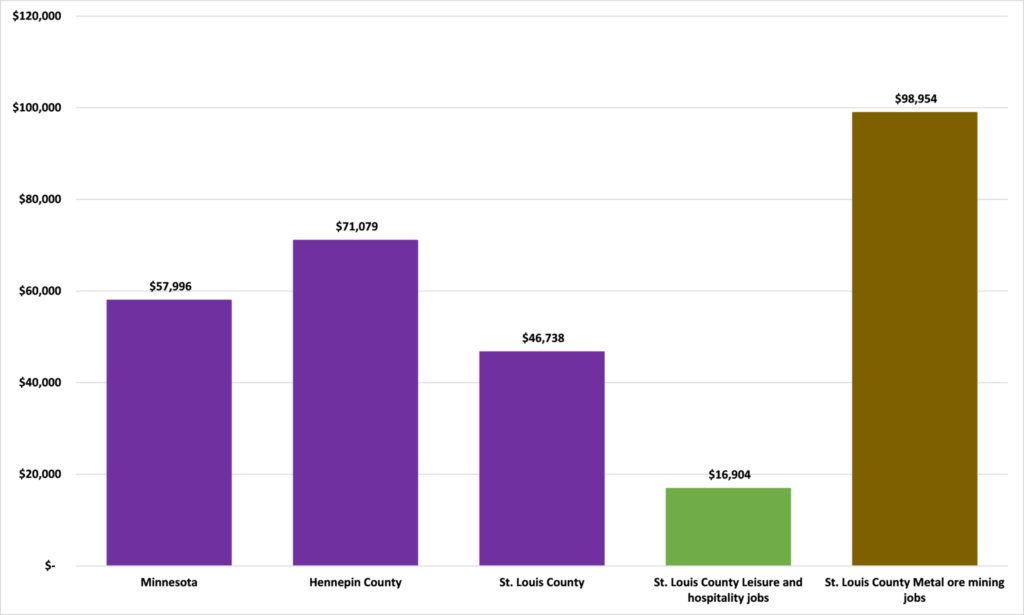Metro Democrats Take Aim At Minnesota’s Mining Industry (Again)
Congresswoman Betty McCollum, who represents St. Paul, has once again taken aim at Minnesota’s mining industry by inserting language into a federal spending bill that would prevent federal agencies from reviewing mine plans within the Rainy River Watershed and Superior National Forest during the 2021 fiscal year. The measure is a transparent attack on the mine plan proposed by Twin Metals Minnesota, but it would also prevent federal agencies from moving ahead with permitting any iron ore mines, or even gravel quarries, that might seek federal approval to operate a mine.
According to the Duluth News Tribune:
“None of the funds appropriated or otherwise made available by this Act may be used to review or approve a mine plan proposed within the Rainy River Watershed of the Superior National Forest,” the bill’s text reads.”
This legislation sets a very bad precedent for Minnesota’s iron ore industry, which is a key pillar of the Northeastern Minnesota economy. As we have discussed, mining jobs are some of the best jobs in the state, paying $98,954 in wages, according to the Bureau of Labor Statistics. This is the equivalent of someone earning $47.50 per hour, assuming 52, 40-hour work weeks.
In contrast, the average leisure and hospitality job in St. Louis County pays only $16,904, which is the equivalent of someone working year-round for $8.12 an hour.

It’s is no surprise, then, that the people of Northern Minnesota are eager to see more mining in their region, including developing Minnesota’s copper-nickel deposits, which are some of the largest undeveloped deposits in the world.
American Experiment used the economic modelng software IMPLAN to estimate the economic impact of developing Minnesota’s copper, nickel, cobalt, platinum, and titanium deposits and determined that as many as 4,660 new mining jobs could come to fruition by developing these resources in an environmentally responsible way. Approximately 750 of these jobs would come from the Twin Metals project that McCollum wants to kill.
Liberal media outlets love to conveniently forget that the leases for the Twin Metals mine were inappropriately cancelled in the final days of the lame duck Obama/Biden administration. Emails revealed by the Wall Street Journal show even Amy Klobuchar understood that the cancellation of these leases was based on politics, not science.
McCollum’s statement defending her attempt to delay the Twin Metals mine was nakedly partisan. In her statement, she wrote:”This language protects the BWCA until we are able to work with a more trustworthy (presidential) administration next year.”
What Congresswoman McCollum means by a more trustworthy administration was not made abundantly clear in the Duluth News Tribune article, but a statement made by per political director to MinnPost in May might give us more insight into what actions a Biden administration might take on the proposed mine. According to MinnPost:
“Since it was the Obama-Biden administration who withdrew those mineral leases, initiated the environmental review, and proposed a ban on new mining in the watershed, we have no reason to expect that a Biden administration would change course,” said McCollum’s political director, Charlie Hammond.
The Trump Administration has begun evaluating the Environmental Impact Statement submitted by Twin Metals, and that would have to be stopped if McCollum’s measure were to become law. The evidence we have suggests that this is a delay tactic to prevent the mine from advancing in the permitting process, with the ultimate hope that a Biden administration would table the project indefinitely.
Comfortable urban liberals love to thumb their nose at Northern Minnesotans who support the mining industry and see it as a vital part of their past, present, and future, but they rarely are forced to acknowledge that their “not this mine, not this place” mentality is the epitome of environmental privilege.